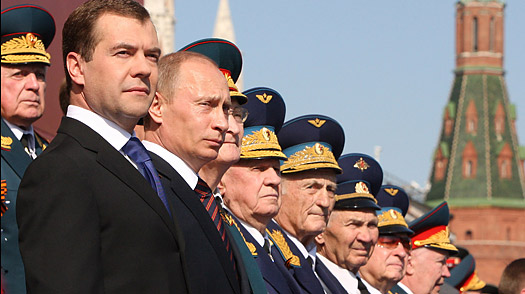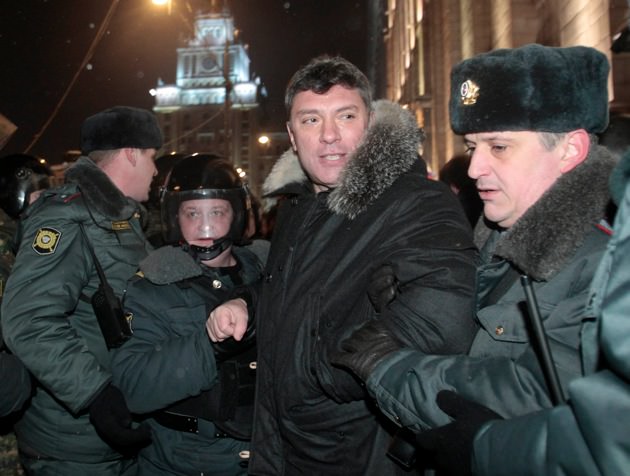Since a Russian judge sentenced former Yukos oil executive Mikhail Khodorkovsky and his business partner, Platon Lebedev, to thirteen and a half years in prison on December 30, many commentators have viewed the outcome—after a 22-month trial that openly flouted judicial standards—as a major setback for Russian President Dmitry Medvedev. After all, a little more than a year ago, Medvedev gained international attention for vowing to institute the rule of law in Russia and make foreign investment in Russia a top priority, and there had been growing speculation that he might begin to take on the entrenched interests of Prime Minister Vladimir Putin. For the moment, those hopes seem dashed. In the long run, however, the case against Khodorkovsky and Lebedev may hurt Putin more than Medvedev as the two rivals position themselves for the 2012 presidential contest.
Ostensibly, the Khodorkovsky case—the second against these two long imprisoned executives—concerned charges of financial misdeeds when Khodorkovsky was head of Yukos. In December, Judge Viktor Danilkin found Khodorkovsky and Lebedev guilty of stealing 218 million tons of oil and of money laundering, and the new sentence prolongs the current term both are serving until 2017. But there has long been little mystery about the underlying forces behind the case.
Khordokovsky and Lebed were first arrested in 2003 and subjected to a lengthy trial on seemingly bogus charges of tax evasion in selling their company’s oil. (In the second trial, they were accused of stealing the very same oil that they had allegedly failed to pay taxes on when they sold it!) The Kremlin, Putin in particular, profited both financially and politically from the arrest of Khodorkovsky. The bulk of Yukos’ assets (including those held by western investors, which the company had actively sought.) was transferred to the state-owned oil company, Rosneft, which is chaired by Putin’s right-hand man, deputy prime minister Igor Sechin. More importantly, Putin got rid of a potential rival, who disobeyed the cardinal rule that Putin set down for Russia’s wealthy oligarchs: stay out of politics. Before his arrest, Khordorkovsky had openly criticized Putin’s policy of “managed democracy” and even started to fund political parties that challenged the Kremlin.
Now, with the new sentence, which the defendants are appealing, with little prospect of success, Khodorkovsky will conveniently be out of the picture long after the 2012 elections for the Russian presidency, whose main candidate, Putin or Medvedev, has yet to be decided upon. As former Duma member Vladimir Ryzhkov has pointed out, the sentence is draconian:
In thousands of cases of murder, rape, robbery, assault with weapons, the court finds mitigating circumstances and gives sentences of five, six, eight years. Thirteen and a half years for an economic crime is, of course, a vendetta … What Khodorkovsky and Lebedev did with Yukos did not violate the Russian law and was absolutely no different than what Alekperov, Deripaska, Abramovich [wealthy oligarchs who are close to Putin], and what the companies Rosneft and Transneft did.
Many observers suggest that the trial was a test of Medvedev’s intentions to reform the legal system and his ability to do so. Over the past year, Medvedev has talked repeatedly about getting rid of the “legal nihilism” that characterizes the Russian system of justice. Following the scandalous case of Sergei Magnitsky, for example, a Russian lawyer who died in prison in November 2009 because he was denied medical treatment while awaiting a trial on tax charges, Medvedev dismissed a number of prison officials and ordered a significant reduction in the staff of the Ministry of Internal Affairs, which bore much of the blame for Magnitsky’s death. But the Khodorkovsky verdict demonstrates his seeming powerlessness when it comes to high-profile political cases in which the Putin clan is directly involved. (Indeed, a Moscow court ruled that a recent Medvedev law making it illegal to imprison people for economic crimes before their trial did not apply to Khodorkovsky and Lebedev.)
In that sense, the Russian president has failed to distance himself from Putin, disappointing those who had hoped that he would move from rhetoric to action. Russian journalist and politician Vladimir Kara-Murza observed: “Whatever pleasant-sounding speeches he [Medvedev] makes now, nobody will listen. The Kremlin’s ‘good cop’ show appears to be over.” And Medvedev’s much-vaunted plans for encouraging investment in Russia have suffered a huge setback because of the negative message the verdict sends to potential investors: if you get too big or profitable, the state may seize your assets. Medvedev admitted to a group of Russian businessmen on December 29 that the business climate was “bad, very bad.”
Nonetheless, it does not necessarily follow that Medvedev has lost all chance of remaining Russia’s president after the 2012 elections. The Khodorkovsky affair has made Putin, the Kremlin’s “bad cop,” look even worse than usual. His injudicious comments, made before the verdict had been delivered, about Khodorkovsky being a thief who deserved to be in jail brought an implicit reprimand from Medvedev, who insisted that it was wrong to discuss the case until after the trial. Putin’s remarks reinforced the impression that the case against Khodorkovsky was a result of a personal vendetta against him. (Significantly, a poll conducted by the independent Levada center in 2009 found that 60 percent of Russians believed that the Kremlin, not the courts, would decide the fate of Khodorkovsky and Lebedev.)
Advertisement
The verdict against Khordokovsky and Lebedev has also galvanized the Russian opposition, who defied the authorities by conducting protest demonstrations in Moscow and St. Petersburg a few days ago. Interestingly, Medvedev had earlier stunned his television audience when in his annual address on December 24 he mentioned a group of opposition leaders that included Mikhail Kasyanov, Boris Nemtsov, Eduard Limonov, and Garry Kasparov: “People have different attitudes toward them. They have, so to say, their own electorate. But they are also public figures.” Medvedev also had this to say about political opponents: “The fact that they are in opposition does not mean that they are cut off from public life. They should openly speak about every problem.” For the most part opposition leaders have reacted to Medvedev’s words with skepticism. But some, such as Nemtsov, co-chairman of the Solidarity movement and one of Putin’s fiercest critics, continue to urge Medvedev to get rid of Putin and introduce democratic reforms.
It is perhaps no coincidence that Nemtsov was arrested, along with Limonov, during the demonstrations and both remain in jail. The pro-Putin clan, the so-called siloviki, who are probably behind these arrests, clearly want to send a message that is in direct contrast to Medvedev’s tone of tolerance. But the siloviki may not have a true grasp of the country’s mood. According to a recent Levada poll, the number of people who favor an authoritarian regime in Russia has fallen in the past year from 40 to 27 percent, and 67 percent said that Russia needs a viable political opposition. Putin is still a popular politician and probably the front-runner for the nomination to the Russian presidency by the United Russia Party, which dominates the parliament. But the youthful, mild-mannered Medvedev, who scrupulously avoids seeming belligerent or arrogant, should not be discounted just yet.




